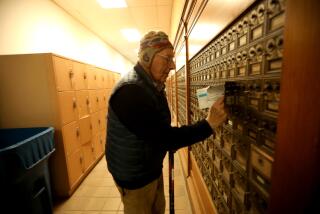Renovation of Old Neighborhood Undermines Family’s Sense of Home : Housing: Gentrification revitalizes many run-down areas. But in such places as Fox Point, R. I., longtime residents can no longer afford to live there.
- Share via
PROVIDENCE, R. I. — In another time, returning home from work at the docks in Fox Point could take hours because everybody knew everybody in the waterfront neighborhood settled by descendants of Old World seafarers.
On a summer afternoon, there might have been time to sit on a neighbor’s porch for an iced tea, or time to stop at Manny Almedia’s Ringside Tap for a sausage sandwich and a beer.
In those days, relatives and friends followed early immigrants across the Atlantic from Portugal, or from the Portuguese-speaking Cape Verde islands off West Africa, to live in cold-water tenements. Extended families lived together, father and mother on one floor, children and grandchildren on another.
Ah, those were the days for the Britto brothers, whose father came to the United States in 1915 to work as a stevedore.
John Britto, who was born in Fox Point 57 years ago and never moved more than half a mile, doesn’t use the word gentrification, but that’s what he’s talking about when he says sadly, “You don’t know your neighbors anymore.”
In the 1970s and ‘80s, the old Fox Point gave way to a new one. Neighboring Brown University purchased property there, and a combination of yuppies, real estate speculators and historic preservationists bought many of the houses with help from government tax credits. They renovated them and sent the prices up by as much as tenfold.
Not only could working-class renters no longer afford their old neighborhood, in some cases, they could barely recognize it.
Along Wickenden Street, the main thoroughfare, Manny Almedia’s was turned into The Cafe at Brooke’s, offering pepper provolone quiche and California burgers with avocado and Cheddar.
“My landlord had raised our rent the first time, which wasn’t bad,” explained John Britto. But in 1980, the block where he and his wife and their six children lived was rezoned from residential to business, and the landlord came back.
“All of a sudden, he wanted to put a lawyer’s office in his tenement and he raised (the rent) where I couldn’t afford it--maybe a couple of hundred more. This is what they’re doing. It happened to all of us.”
By sheer persistence and with help from friends and politicians, Britto and his family managed to stay--”My roots are here,” he said--taking over a three-story tenement house marked for demolition by the city Redevelopment Authority and fixing it up.
But two of his brothers, Sylvester, 53, and Vincent, 64, had to move when their landlords raised the rents.
After living in a triple-decker house for 22 years with his wife and three children, five years ago Sylvester and two other families were asked to move. The landlord told them he was redoing the house and would let them know when it was finished. They never heard from him again.
In another neighborhood across town, Sylvester found a place for his family to live. “I was one of the lucky ones,” he said. “The people downstairs had to go live with a daughter.”
Even so, he added, “I don’t do nothing up here. I go to Fox Point.”
As for Vincent Britto, even though he still misses his old neighborhood after 14 years, he wouldn’t move back today. He’d feel lost.
“It’s not like it used to be,” he said. “All you had to do was come out of your house, you’ll see someone you know. It’s all strangers there now.”
But the Cape Verdeans do come back once in a while, gathering in the Fox Point Boys Club, recapturing the memories and their youth.
On one such occasion, Vincent Britto looked around at the 25 men sitting in the club, one of the last vestiges of the ethnic neighborhood. Only two of the men still were living in Fox Point, one being his brother John.
“We meet once a month,” John Britto said. “They come to see each other, to make sure everybody’s OK. We talk about old times. Sure, everything’s changed. Some people say it changed for the betterment of Fox Point, but I’m saying the faces change, the people change. Most of the people that lived here are gone. They’ve either moved or passed away.”
As the other men left, John Britto lingered, casting a lonely figure across the empty auditorium floor.
“A lot of these guys, I won’t see until next month,” he said. “Before, when we had the neighborhood, it was a warm feeling. We would gather like every day. I miss the people. I miss a lot of good friends.”
No one knows for sure how many residents of Fox Point were displaced. The 1980 census figures, the latest available, put the neighborhood’s total population at 5,499, but no breakdown by ethnic group is available.
In her book, “The Immigration and the Settlement of the Portuguese in Providence: 1890-1924,” Susan Terry Ferst wrote that during that era Fox Point was about 50% Portuguese and Cape Verdean.
“There’s still a substantial number of Portuguese and Cape Verdeans in Fox Point, but not nearly the large population as was 10 to 15 years ago,” said Thomas Moses, director of planning and development for the city of Providence.
Most moved to more affordable areas as their old neighborhood was renovated, Moses said.
“The biggest negative is that it fractured them as a group,” he said.
Some of the men at the Boys Club singled out Brown University, saying it had bought up property and that its students had taken over renting the renovated tenements, living three and four to a house.
Robert Reichley, vice president for university relations, said that although Brown’s wholly owned real estate subsidiary might buy houses and rent them, their ultimate use is for educational purposes, such as classrooms and research buildings.
“The impact that Brown had specifically was really in the decade of the ‘60s and maybe into the middle ‘70s,” he said. “But since that point, the impact of gentrification on Fox Point is unmistakable, and it is not the result of Brown. It is the result of people finding, in many cases, good real estate values which they have then improved upon.”
Along with higher property values have come upscale restaurants and shops, but that’s not why Fox Point’s old residents return.
Many times, the Cape Verdeans and Portuguese, who have scattered into the suburbs of East Providence and Bristol, meet when there is a death among them.
“And after that wake,” says John Britto, “it’s ‘I’ll see you later at the next wake.’ ”
More to Read
Sign up for Essential California
The most important California stories and recommendations in your inbox every morning.
You may occasionally receive promotional content from the Los Angeles Times.













